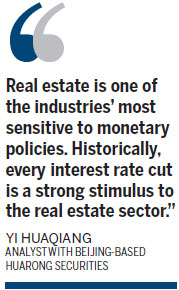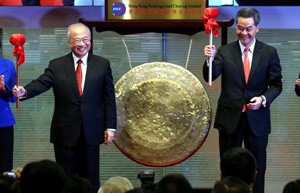Chinese real estate stocks continue rise on rate cut
Updated: 2014-11-25 11:51
By Niu Yue in New York(China Daily USA)
|
||||||||
Chinese stocks related to real estate rallied Monday after the surprise cut in interest rates by China's central bank on Friday.
Shares of China's largest property developer, Vanke, based in Shenzen, surged more than 13 percent in Hong Kong, the first trading day after the rate cut.
China Overseas Land & Investment Ltd rose 11 percent; Country Garden Holdings Co Ltd lifted by 10.5 percent; China Resources Land Ltd surged 10.4 percent; and Poly Property Group Co Ltd finished higher by 8.8 percent.
Hong Kong's Hang Seng Property Index rose more than 3.5 percent.
Xinyuan Real Estate Co Ltd shares, trading under the symbol XIN on the New York Stock Exchange, gained more than 10 percent from last Friday to Monday.
"Real estate is one of the industries' most sensitive to monetary policies," wrote Yi Huaqiang, analyst with Beijing-based Huarong Securities, in a note. "Historically, every interest rate cut is a strong stimulus to the real estate sector."
The People's Bank of China (PBOC) lowered the one-year benchmark lending rate by 40 basis points to 5.6 percent and the one-year deposit rate by 25 basis points to 2.75 percent. The interest rate cut, which took effect on Nov 22, was the first in more than two years.
China's real estate market has been struggling in 2014. In the first three quarters, sales of commercial properties decreased 8.6 percent, while inventories increased 28 percent, according to the National Bureau of Statistics (NBS).
Sixty-seven of 70 cities monitored by the NBS reported falling housing prices from the year-ago period in October, at an average rate of over 2.6 percent. Property developers are struggling to clear their inventories through discounts.
In some cases, the discounts could be so large that earlier buyers who paid higher prices smashed developers' offices seeking compensation.
The interest rate cut makes both property developers and home-buyers pay less interest, helping both the construction of and purchase of properties, according to Yi.
Real estate contributes to more than 15 percent of China's economy and impacts more than 40 industries, from banking to home appliances. Around 20 percent of China's unpaid loans, or more than $2.6 trillion, is in real estate.
"They (Chinese government) don't want real estate to sour," said Monty Guild, chief investment officer of California-based Guild Investment. "They don't want the loans to go bad." Guild said the rate cut would help the sector.
The liquidity injection also will boost international trade, said James Bacchus, a former chairman of the World Trade Organization's Appellate Body, as it creates demand for commodities and Western-made products.
The move will also "cause the Chinese yuan to fall against the US dollar", said Guild. "This will create demand for US dollars and US stocks."
"It's good for everyone," Bacchus said.
However, "construction and basic materials are no longer the growth sectors of the Chinese economy", said Guild, as those sectors already are large and unlikely to grow as fast.
"Faster-growing sectors include consumer goods, retailing, Internet, high tech, pharmaceutical and medical," Guild said.
"We believe that China will pursue both structural reform and growth," he said.
He told China Daily that lower rates will benefit industries outside real estate, and that the Chinese government should still look to have an economy driven by consumption rather than investment.
Lu Huiquan in New York contributed to this story.

(China Daily USA 11/25/2014 page1)

 Ferguson grand jury has reached decision
Ferguson grand jury has reached decision
 Top 7 affects of rate cut on people's life
Top 7 affects of rate cut on people's life
 42nd International Emmy Awards held in New York
42nd International Emmy Awards held in New York
 Forbidden City more welcoming
Forbidden City more welcoming
 Olympic champ Sun Yang failed doping test in May
Olympic champ Sun Yang failed doping test in May
 Top 10 kinds of foreigners in China
Top 10 kinds of foreigners in China
 Trending: Hangzhou man licks out painting
Trending: Hangzhou man licks out painting
 Rio 2016 mascots combine Brazilian fauna, flora
Rio 2016 mascots combine Brazilian fauna, flora
Most Viewed
Editor's Picks

|

|

|

|

|

|
Today's Top News
Hagel move won't affect China-US ties: experts
China's nuclear power bid saluted
No indictment of officer in fatal Missouri shooting
Chinese real estate stocks continue rise on rate cut
Women entrepreneurs get financial tips
Wealthy want kids to study abroad
Breast cancer study receives $1.5 million grant
SAT scores canceled for some test-takers in China, Korea
US Weekly

|

|







